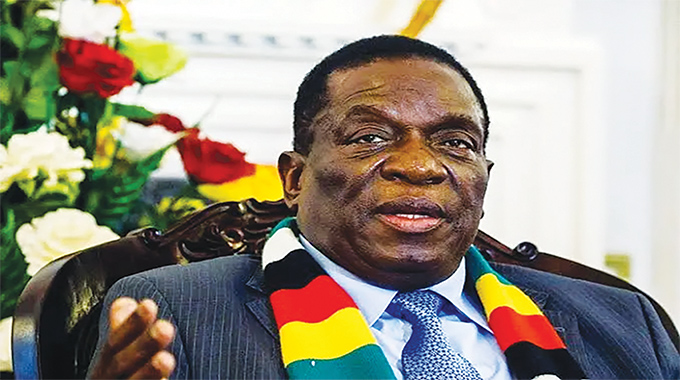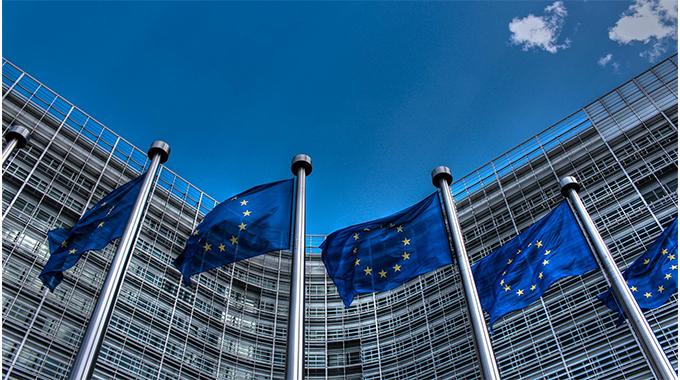President Mnangagwa: A conflict resolution legend of Zimbabwe

Pedzisai Sixpence, [email protected]
The rise of President Mnangagwa to the country’s helm saw Zimbabwe taking a progressive arc in non-toxic politics both locally and internationally.
The energy displayed by his administration to realign Zimbabwe’s image on the international arena has been so visible and difficult to ignore.
As a highlight, Zimbabwe has, after a long period of diplomatic isolation, initiated a number of diplomatic efforts to defrost relations with Western countries as well as international and regional organisations such as the European Union (EU), the Commonwealth, International Monitory Fund (IMF) and the World Bank (WB).
President Mnangagwa has gone beyond the anticipations of many by going for the most frozen conflicts in the country.
Key conflict resolution efforts on this list include determinations to resolve differences in the post Robert Mugabe era; the land related conflicts with former white farmers; pre- and post-election conflicts; the inclusion of formerly marginalised areas in the National Development Agenda; the conferment of national hero status to the late Reverend Ndabaningi Sithole and now, the Gukurahundi issue.
This list, short as it might appear, is so loud in showing the level of political pledge when it comes to conflict resolution and national unification by President Mnangagwa.
Conflict resolution under the leadership of President Mnangagwa is visible on how he has handled internal politics of Zanu-PF itself since he became the First Secretary of the party in 2017.

European Union
In a space of six years, the President has welcomed the majority if not all of the senior members of the ruling party who failed to make it into the government of the Second Republic’s administration.
From this angle, President Mnangangwa reconciled with the Mugabe family as noted by his contribution when the former first lady, Grace Mugabe, lost her mother on 31 August 2018.
The government played a critical role at the funeral of the former President Robert Mugabe in September 2019. The level of reconciliation with this family was evident through the attendance of the Mugabe family to the 2023 inauguration of President Mnangagwa.
The President has also mended relations with the former Vice Presidents, Joyce Mujuru and Phelekezela Mphoko. The two also attended the inauguration of President Mnangagwa at the National Sports Stadium after the August 2023 elections.
In 2018, Joyce Mujuru contested as a presidential candidate against President Mnangagwa. In that election, Joyce Mujuru, as a leader of the National People’s Party (NPP), contested as a coalition candidate for the People’s Rainbow Coalition. Following her appeasement with President Mnangagwa, Joyce Mujuru did not race in the 2023 elections.
Other notable developments in this regard include the readmission into the party of former Cabinet Minister, Ignatius Chombo as well as the cordial interactions witnessed from the testimony by former Provincial Minister for Manicaland, Mandi Chimene after meeting President Mnangagwa in Mozambique in November 2023.
Under his guidance, the ruling party has witnessed the highest number of senior politicians from the various opposition camps joining Zanu-PF. At this point, the name of Blessing Chebundo, who once contested and won an election against the president in parliamentary elections, is a key person to note.
Through the Huyai Kumusha/Buyanini Ekhaya/Come Home programme, Chebundo has been instrumental in leading the return of opposition sympathisers and leaders into Zanu-PF.
Another critical issue that smashed Zimbabwe’s political terrain is the land dispute proceeding from the fast track Land Reform Programme (FTLRP) of 2000. On 29 July 2020, the government of Zimbabwe and representatives of the former white farmers signed the historic Global Compensation Agreement (GCA) in which the government devoted to paying US$3,5 billion to these farmers for the developments established on the farms before the FTLRP.
The signing of the GCA in 2020 is a huge testimony to the level of political will that the president has exhibited since 2017.

World Bank
It should be remembered that the development was an implementation of the critical provision of the national constitution, specifically section 72(3) of the 2013 constitution. Although there has been mixed palate to the details, the funding and the participation to this development, it can be agreed that the Second Republic is not relaxed on issues of conflict resolution.
The post-election conflict resolutions adopted by President Mnangagwa in 2018 and 2023 are above ordinary.
The election management approach by the Second Republic under the leadership of President Mnangagwa has confused his opponents and confirmed his legendary political will to resolve conflicts. In 2018, Zimbabwe invited the broadest Election Observer Missions since 2002 when the previous administration seized inviting some observers specifically the European Union (EU).
Additionally, the participation was so huge with a tall list of 23 presidential candidates competing for the presidential post. Comparatively, the election process was peaceful. Post-election, Zimbabwe witnessed street demonstrations before the announcement of the results which resulted in the death of six people while more than 30 people were injured in the Central Business District of Harare.
Unpredictably, President Mnangagwa appointed a Commission of Inquiry as provided for within the country’s legislations specifically section 2(1) of the Commissions of Inquiry Act [Chapter 10:07] through Proclamation Number 6 of 2018 published in Statutory Instrument 181 of 2018.
The Commission, generally known as the Monthlante Commission, was tasked to study the post-election conflict.
Aggrieved parties and witnesses to the incident were given a chance to testify before a panel comprising of local and international professional panellists on that matter.
On the same note, the creation of the Political Actors Dialogue (Polad) was also critical in resolving political conflicts in the country.
The level of generality displayed in the period after the 2018 elections is a clear signal of the President’s political will towards solving any conflict in the country.
The peaceful environment witnessed before, during and after the 2023 harmonised elections confirmed the relevance of the efforts employed to rectify the election conflicts in Zimbabwe by the Second Republic.
The issue of regional imbalances and marginalisation is also among the list of shelved conflicts capitalised upon by government’s critiques that include opposition political parties as well as non-governmental organisations (NGOs) and Civil Society Organisations. From this, the main issue had been on the marginalisation of the Tonga speaking people from national politics and the development agenda.
The issue of the Tonga people of Binga is traced back to 1957 when this community was relocated from the Zambezi to pave way for the construction of Lake Kariba.
The colonial regime dumped and ignored these people until 1980 when the post-colonial government took over. Surely, the First Republic did very little to correct the imbalances and backwardness in Binga.
Resultantly, the opposition political movements enjoyed electoral victories in this bend with very little resistance from the ruling party as there was not much to show.
The actions by President Mnangagwa since 2017 are worth mentioning as having moved a big way in dealing with the Binga marginalisation crisis.
Under his leadership, the Ministry of Tourism and Hospitality have accelerated its efforts in parading Binga as a resort destination featuring the Binga Sand Beach, Chizarira National Park, the Binga Hot Springs and many other natural lures.
The Second Republic through the Ministry of Higher and Tertiary Education, Innovation, Science and Technology Development, opened the Binga Poly Technical College and enrolled its first group of students in the 2022/3 academic year.
Still on the same note, the Second Republic, through The Agricultural Rural Development Authority (Arda) invested heavily in the popular Bulawayo Kraal irrigation scheme covering an area of approximately 15 000 hectares of land and depending on the perennial Zambezi River. To buttress his energies, President Mnangagwa has regularly visited Binga.

All these exertions, it can be noted, have seen the people of Binga appreciating the efforts of the president by voting for a Zanu-PF Binga North parliamentary candidate, Muchimba Chineka for the first time since 2000.
To the people of Manicaland, President Mnangagwa displayed his extraordinary effort towards conflict resolution when he dug into a conflict of nearly five decades and conferred National Hero status to the late Reverend Ndabaningi Chandiwana Sithole.
The issue of Rev Sithole was one key question confirming that President Mnangagwa is a national unifier whose desire is to leave no one behind when it comes to resolving Zimbabwe’s social and political conflicts.
Rev Sithole, a founding Zanu leader and cleric during the liberation struggle, died in 2000 but failed to make it to the national heroes’ acre despite his contribution towards the liberation of Zimbabwe. His story has been an instrumental campaigning tool by the various opposition formations in Manicaland Province since his death in 2000. Interestingly in August 2022, the Second Republic revisited the decision for a better position that resolved a conflict that worried the people of Chipinge for too long a time.
The Gukurahundi hearings set to start in March 2024 are yet another volley on Zimbabwe’s conflict resolution desires. Through the implementation of the hearings to be overseen by chiefs in Matabeleland South and Matabeleland North provinces under the National Chiefs Council of Zimbabwe, the process is going to make a huge effect on the image of Zimbabwe as a country and thaw relations between the victims and the government.
The implications of these developments in Zimbabwe will go a long way in closing the breathing space of the critics of his leadership whose hunting ground since 2000 has been dominated by issues that the president is confronting. These conflicts have been instrumental in sustaining the political crusade by most opposition movements and have been used to justify sanctions on Zimbabwe which compromised the country’s development imaginations. Again, the conflicts in question have been instrumental in justifying donor funding by local and international NGOs that overcrowded the country since 2000.
Pedzisai Sixpence is a political analyst. He works with the Midlands State University Department of Governance and Public Management.











Comments